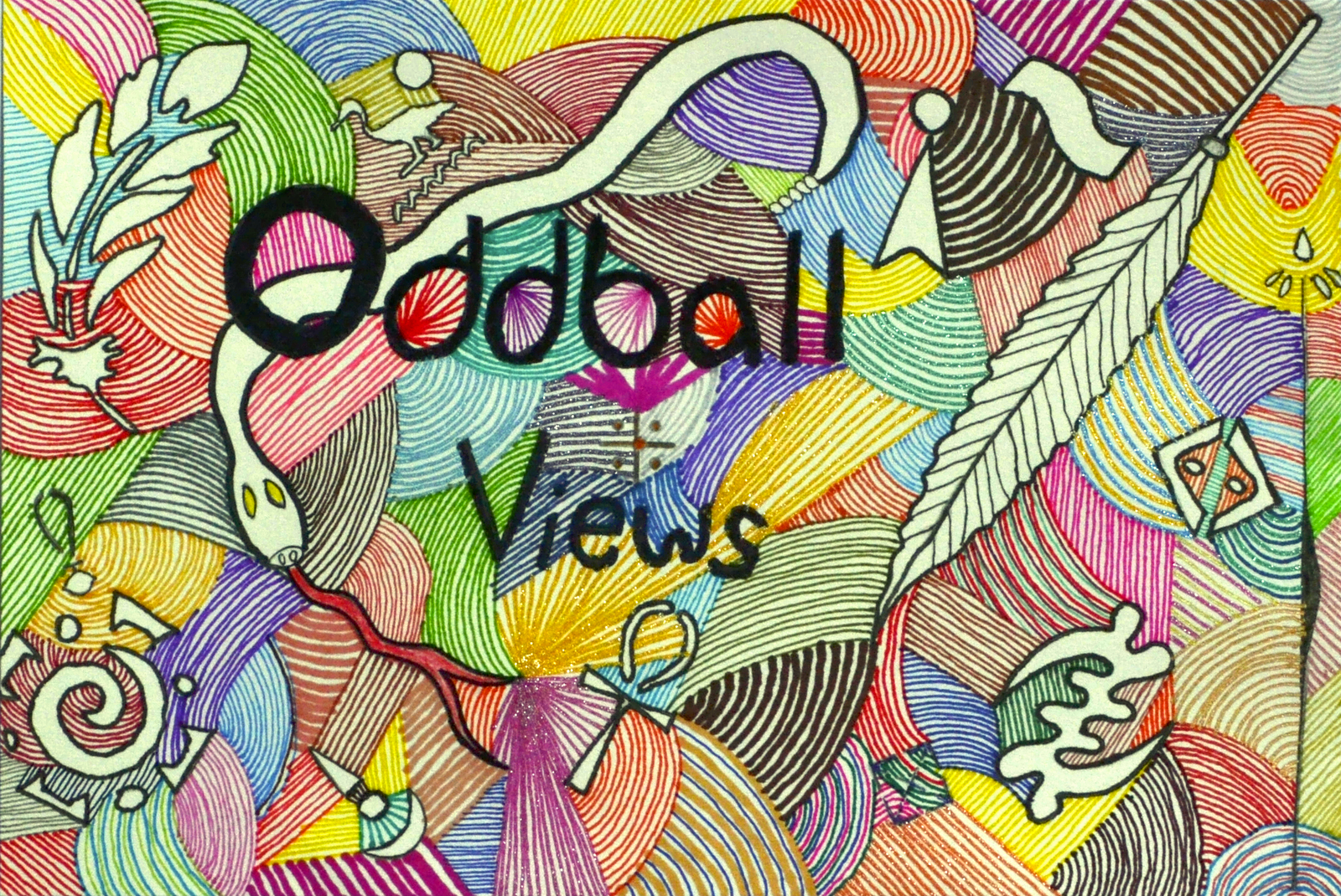Some Early Works
Drawings and Stories from my journey
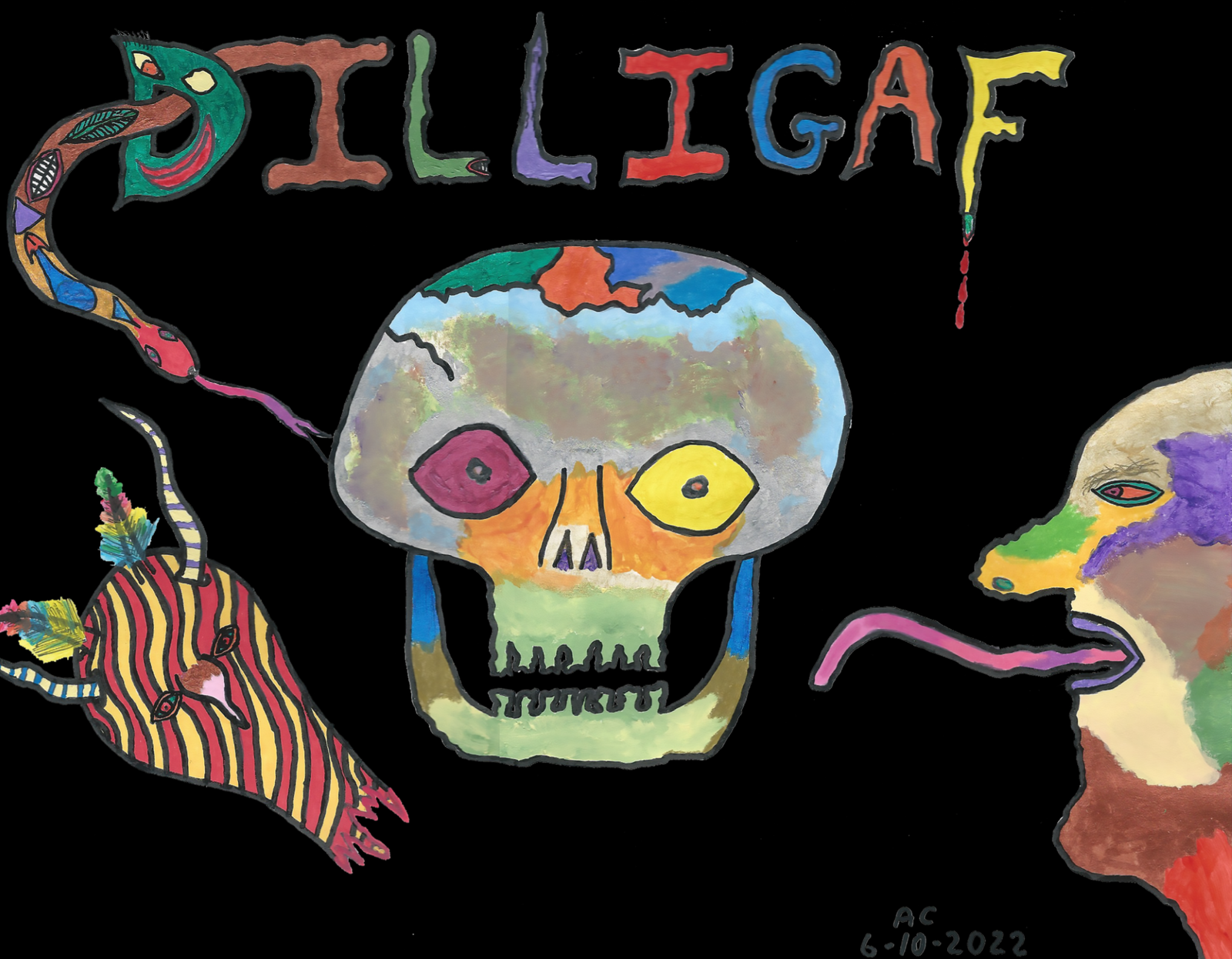
DILLIGAF
2084 felt like a half-remembered dream: chrome spires crowned by perpetual dusk, hovercars humming lullabies through neon gutters. In the backroom of an antique arcade, a painting pulsed under ultraviolet lamps. Its center bore a patchwork skull with misaligned eyes; two surreal figures flanking it stretched their tongues toward the chattering bone. Above, letters danced in riotous hues: DILLIGAF.
Juno Remy, a decommissioned neural-surveyor turned relic hunter, first saw it at a black-market auction. He’d been tracking memories stolen from dissidents—fragments trapped in retro signage—and something about that skull felt like a stolen thought begging rescue. He bid against a swarm of data-monks and won.
Back at his loft, Juno unpacked the canvas with reverent caution. The walls, littered with holographic schematics, flickered as if sighing. He laid a neural probe against the frame. Immediately, his vision fractured into thousands of glowing shards: memories not his own—riots led by mime-philosophers, an AI preaching absurdist poetry, a carnival where laughter dissolved into screams.
Juno staggered back as the painting’s colors shifted to form words: “They gave up. DILLIGAF.” He rang his friend Tanvi Shah, a cybernetic dramaturge who authored virtual tragedies in her sleep. Over crackling comms she said, “Sounds like a manifesto. Could be code for a lost experiment—something they swore never to revive.”
They recruited Ari Cavanaugh, a glitch poet whose skin occasionally pixelated, and Dr. Selene Ortiz, a biohacker sculpting living fungus into wearable art. Ari admired the painting’s warped humor; Selene saw in it a pathogen for human perception.
Together, they traced DILLIGAF’s origins to Cassandra Labs, a defunct think-tank that once merged psychoactive drugs and quantum computing to erase regret. The project collapsed when test subjects vanished into their own mindscapes. Before closure, an insider smuggled out the final prototype: the painting, encoded with the core algorithm.
Intrigue deepened when Tanvi discovered a missing-person report for Cassandra’s lead scientist, Magnus Rhee. He’d disappeared the night the lab shut down. Rumor claimed Rhee uploaded his consciousness into art, fleeing physical form. The group theorized the painting was his vessel.
Ari insisted on a live test. Against better judgment, Selene injected Juno with a nanofluid designed to attune his neurons to the canvas. He stared into the skull’s hollow gaze and felt his sense of self unravel, spilling into the neon void behind his eyelids.
When he opened his eyes, the loft was empty. The painting floated mid-air, its tongues flicking like tongues of flame. A voice, muffled and urgent, pressed against Juno’s mind: “Find me before they find you.”
He found Tanvi in a subterranean theater where shadow-actors recited Kafka on acid. She whispered that Cassandra Labs left clues in their abandoned data-vaults hidden in derelict satellites. Selene hacked into orbital logs while Ari performed a chant that bent reality’s seams.
At the vault’s coordinates, a silent satellite orbited low. Inside, they uncovered a crystalline chamber housing Rhee’s preserved cortex. The scientist’s final message glowed across holo-panels: “DILLIGAF—an acronym for the ultimate relinquishment: Do I Look Like I Give A Fuck.”
He believed the painting could fracture mortality, scattering consciousness across timelines. But a rival sect, the NullJudgers, wanted to weaponize that freedom, erasing foes by dissolving their identities.
A firefight erupted under flickering fluorescent tubes. Selene lobbed a bio-grenade that sprouted sentient vines, tangling NullJudgers in bioluminescent roots. Ari’s voice warped sound waves, disorienting attackers with infectious giggles. Tanvi projected holographic doubles to confuse their sensors.
Juno reached the crystal cocoon and pressed the painting’s canvas to the chamber. The skull’s teeth clicked open like a mechanical maw. Light exploded. He felt every lost memory he’d ever patched into his mind surge through him. For a moment, he was infinite fragments of self.
When the glow subsided, the chamber lay empty. Rhee’s cortex, the sect’s soldiers, even the painting had vanished. Only Juno and his companions remained, breath ragged, hearts pounding in unison.
They returned to Earth orbit to find the sky unblemished by satellites. Neo-sunlight warmed their faces as if granting reprieve. But Juno’s wrist buzzed: a holo-message with no sender. A single word shimmered in shifting colors:
DILLIGAF.
He closed his eyes, sensing the strands of reality still whispering his name. Some experiments never end.
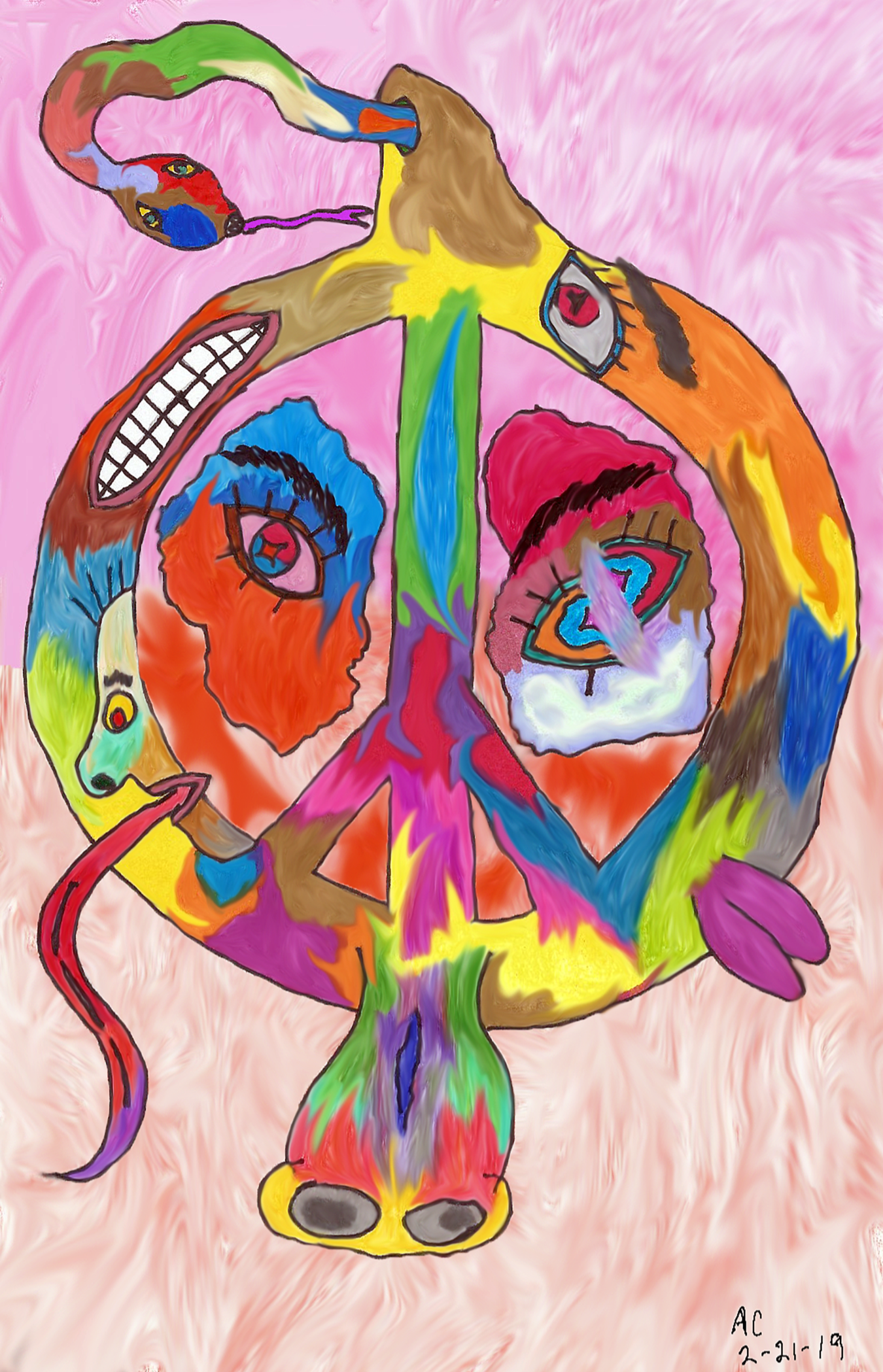
A Second Peace
A violet dusk draped over Black Haven before Dr. Evelyn Hart and Jasper Reed arrived by rail. The township huddled behind wrought‐iron gates and thick hedges, a clutch of turrets and chimneys half‐hidden in ivy. Word was the villagers tolerated few strangers—and fewer smiles from them—but Evelyn’s ledger claimed they could quantify every flicker of suspicion.
They were greeted at the dilapidated station by Tomas Becker, son of the local stonemason, his trousers smeared with lime. He glanced at Evelyn’s notebook, then offered a cautious nod. “Council meets tonight. They’ll decide if you linger.”
Inside the Great Hall, elders sat in a circle on wooden benches. Reverend Crowe, his voice half‐whisper, explained: “We hear tales of your experiment, Doctor. We guard our peace.” Evelyn, steadying her pen, proposed a communal gathering—an “emotional census” under the old chapel’s mosaic, titled A Second Peace.
They trudged through narrow lanes to the chapel ruins. Moonlight filtered through shattered stained glass, illuminating a circular tableau on the floor. Hundreds of faces, eyes wide or narrowed, formed a kaleidoscope around a coiled serpent and a soaring swallow. Colors shimmered despite decades of dust—ochre, emerald, magenta.
Tomas swallowed. “They say if you stare too long, you see your own guilt.”
Evelyn smiled. “Good. Guilt is data.”
That evening, the council led them back to the mosaic. A ragtag dozen assembled:
- Eliza Page, banker’s orphan turned seamstress, her laughter sudden as a bell.
• Samuel Crane, a carpenter’s assistant whose satirical sketches mocked propriety.
• Marguerite “Maggie” Laurent, midwife’s heir, whose ribald jokes left men blushing.
• Alejandra Ortiz, cook from across the sea, her spicy stews furrowing brows then cracking smiles.
• Henry Caldwell, heir to a distant steel fortune, polished and out of place.
Jasper recorded every tremor, every sideways glance. Evelyn guided them through “fear thresholds,” measuring heart rates with brass instruments. At first, the circle dissolved laughter like yeast: Maggie recounted trapping rats in the belfry (“They squealed better than Gray’s sermons”), Alejandra teased Henry on his waistcoat (“Did your tailor charge extra for deeds of steel?”). Even the reverend cracked a grin.
In the hour before midnight, they reached the “Revelation Phase.” Evelyn asked them to step onto the mosaic, one by one, naming the face they most resembled. Tomas hesitated at a pale-eyed youth clutching a hammer—too close to his father’s memory. Eliza chose a laughing maiden with cracked lips. Samuel pointed at a grinning skull half-hidden behind fluttering chicken feathers. Maggie embraced a snarling toad. Henry froze before a pair of wide, watchful eyes. And Alejandra paused at a bird in flight, beak clenched around a shining key.
As each spoke, their voices echoed, then warped, like laughter drawn through a cathedral pipe. Strange colors pulsed beneath their feet; the serpent and swallow seemed to stir.
When Evelyn beckoned Jasper forward, he stepped into the center. He whispered, “I see you,” gazing at one of the serpent’s coils where two eyes glowed red. The tile cracked. A dull rumble rolled through the chapel. Reverend Crowe raised his lantern—and the swirl of color had bled into the floor, blotches of magenta and jade creeping across stone.
Panic rippled. Henry yanked Alejandra’s arm. Maggie scooped up her bottled laughter—she’d captured crowds’ hilarity to sell in town—and hurled it at the swirl. The glass shattered, releasing a jagged cry that reverberated against the walls. Samuel grabbed a plank, brandishing it like a lance. Tomas squared his shoulders, ready to charge. Eliza pressed her palm to her chest, whispering comfort to herself.
Evelyn scribbled furiously, eyes alight. “Perfect. Emotional contagion at sixty‐five percent.”
But as she spoke, a new figure emerged from darkness—a girl fourteen years old, pale as bone, clutching a tarnished brass mirror. No one had noticed her slip in. She raised the mirror at the mosaic; reflected light traced a new pattern among the faces. A swaying silhouette materialized: a woman in tattered shawl, her eyes pockets of sorrow. The girl’s lips quivered. “Mother?”
The specter’s mouth opened in a voiceless scream. Suddenly the mosaic’s serpent animated, slithering across the chapel floor in ruby tiles. The group scattered, furniture toppling. The swallow in flight flapped mosaic wings, beak seeking the girl in the mirror. Tentatively, Alina—daughter of Madam Sinclair the herbalist—took a step forward.
In the turmoil, relationships shifted. Henry, once aloof, knelt to calm the girl, offering his handkerchief. Alejandra delivered a ladle of stew, pushing it across broken pews, murmuring spices might soothe fear. Tomas lifted a beam to shield Alina. Samuel sketched furiously in charcoal, capturing the apparition’s sorrow in broad strokes. Maggie uncorked another bottle—this one full of lullabies—and let the song drift, quelling the shriek without reason.
Evelyn, panting, measured their heartbeats as the serpent froze mid‐slide and the ghostly woman dissolved to motes. Jasper held his notebook aloft, but his fountain pen had run dry—ink mixed with crimson dust. Council members peered through splintered doors, faces pale as ghosts.
By dawn, Evelyn convened the group in the inn’s parlor. She announced preliminary findings: “When confronted by ancestral grief, trust collapses. Yet empathy surged when the youngest showed courage.” Tomas scowled. “You experiment on our dead?”
Evelyn leaned forward. “Your communal trauma—quantifiable. We can…cure these fractures.”
At that moment the chiming clock lost a tooth in its face. The inn quivered. From upstairs, children’s laughter—unseen but clear—drifted down corridors. Madam Sinclair dashed in, her apron stained with poppies. She gasped, “The bedrooms…empty!”
A frantic search unearthed no one. Guests and servants were gone—leaving beds undisturbed. Outside, the mist had turned to motes of light, orbiting the chapel ruins like birds drawn to final rest. The mosaic’s colors bled through cracks into the earth.
Henry gathered the remaining villagers. “We can’t stay.”
Alejandra shook her head. “We need answers.” She glared at Evelyn. “You brought this.”
Evelyn’s lips pressed thin. “I only drew it out.”
Marguerite raised her bottled lullabies. “Then I’ll offer the antidote.” She swung the jar and shattered it on the hearth. A gentle trill rose, weaving through the crowd. For a moment, hearts synchronized—hammering, then slowing—breaths aligning to one fragile rhythm.
In the hush, Jasper spoke: “Someone needs to record what happened.”
But no pen would write. Eliza pressed her palm to the table; ink welled from cracks. She dipped her finger and traced an ouroboros around the chipped paint. The lines glowed, then faded, leaving a single phrase:
“Second peace costs more than first.”
They fled before sunlight could burn away the mist. Evelyn snatched her notebook, its pages splattered with dust and tears. Jasper carried his camera—though every photo returned empty, frames of gray silence. Tomas wrapped Alina in his coat. Alejandra herded stray chickens into a cart. Samuel let go his charcoal, then scooped it back into his satchel, convinced the sketches might speak one day. Maggie tucked the last of her bottled lullabies into her pocket.
They never saw Black Haven again. Stories persist—of a chapel where a mosaic pulses beneath grass roots, summoning faces of strangers and kin. Some say the serpent still coils, the swallow still soars, weaving communities from shards of fear and hope. And on chill nights, when the wind sighs through half‐closed gates, you might catch a fragment of sung laughter—one voice, trembling, seeking a peace that can never be second best.
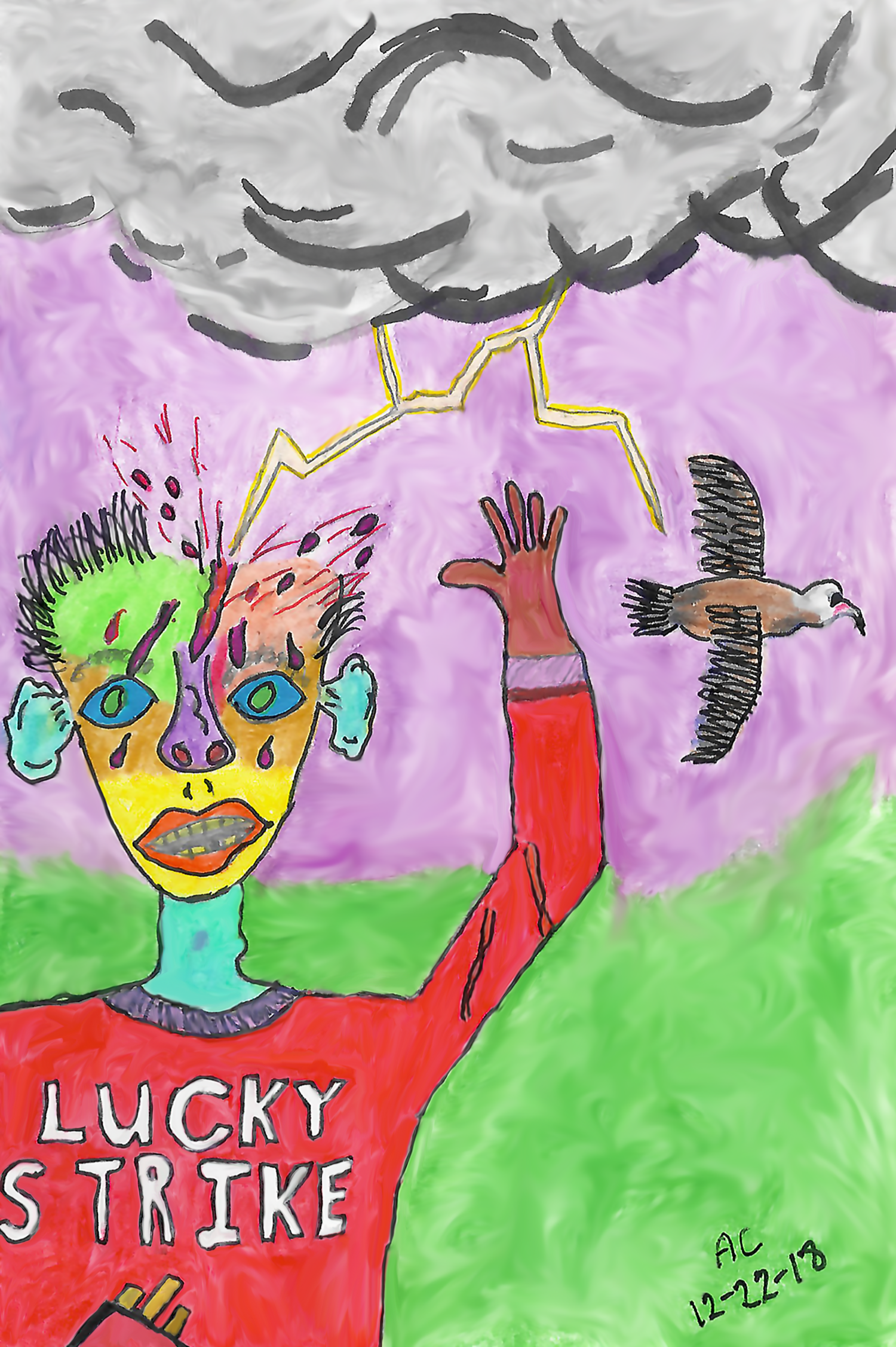
Lucky Strike
Alex Harper’s studio smelled of turpentine and old books. His latest outsider canvas—titled Lucky Strike—dominated one wall: a cobalt‐skinned figure in a scarlet shirt, lightning forks tearing open indigo clouds, a lone bird wheeling above grassy mounds. Beneath the paint, Alex had hidden a sequence of cryptic symbols borrowed from Cold War mind-control files. He never meant anyone to notice.
But this month, screenwriters across L.A. were as blocked as crumpled paper. Alex’s closest friends—Cora Nguyen, Devon Blake, Malik Ruiz, and Iris Chen—each wrestled with blank screens and dwindling deadlines. Their collective frustration was an industry joke… until an unexpected invitation arrived.
Senator Victor Hardwick, a polished war-hero turned presidential hopeful, announced a “Creative Visioning Retreat” at his Malibu villa. He needed fresh scripts to humanize his campaign. The quartet exchanged glances over cold brew. Malik, who lived for conspiracy podcasts, grinned: “We’ll snag our fees and spend a week in beach chairs.” Cora, allergic to politics, sighed but packed her laptop. Alex tagged along—both as friend and amateur detective, itching to decode the secrets beneath Lucky Strike.
- The Villa of Veils
Hardwick’s estate sat behind wrought-iron gates sculpted like fists. Inside, glass corridors overlooked landscaped groves. Devon, ever the iconoclast, noted the silence: no staff in sight. They checked in at a concierge desk and were led to a sun-soaked writing lounge. The senator emerged—tall, alabaster-complexioned, eyes the color of spent thunderclouds. He smiled with practiced warmth.
Over cocktails, he explained the exercise: “Tell my story. Show the people I’m one of them.” He glanced at Cora’s trembling fingers and clapped her arm. “Nerves are good. Keeps you sharp.” Malik whispered, “Candidate or cat burglar?” Iris laughed, though her fingers stuttered on her keyboard.
By midnight, no one wrote a word. Broken melodies of surf and cicadas drifted through open doors. Alex slipped into the villa’s archives—rows of tablets keyed to the senator’s speeches. He downloaded encrypted files labeled Project Lucky Strike. One snippet played: a soft male voice murmuring, “Control the mind, control the vote.”
- Ghosts in the Machine
The next morning, Hardwick’s chief of staff, Lena Park, arrived breathless. “Security breach,” she hissed. “Someone’s been in the vault.” Devon quipped, “Politicians always spill their guts when nobody’s watching.” Malik rolled his eyes. But Alex frowned: “They’re hiding something bigger.”
At breakfast, Iris mentioned a strange glitch in her draft—sentences rearranged themselves overnight. Cora’s blood ran cold: “My research notes were replaced with nursery rhymes.” Across the room, Hardwick’s campaign managers muttered about “electro-cerebral anomalies” sabotaging their data. Alex recognized the pattern: miniature implants that could rewrite memory—an echo of Manchurian Candidate legends.
That afternoon, Alex invited the group to his studio. He unveiled Lucky Strike, pointing out the hidden glyphs. “These codes map neural pathways,” he said. “Someone’s using art to bootstrap subliminal messaging.” Devon scoffed until he saw the matches between Alex’s symbols and the senator’s speech tapes.
III. Conspirators and Confessions
Malik dug through leaked emails and discovered Lena Park’s alias: “Nightshade.” She’d once led clandestine experiments on political prisoners. Iris confronted her: “You injected truth serum…into journalists?” Lena’s smile was colder than a morgue. “I injected compliance.” Silence fell like a guillotine.
Cora, fighting tears, confessed her secret: she’d ghostwritten propaganda films for Hardwick in exchange for college tuition. “I thought I was capturing heroism,” she whispered. “I was scripting obedience.”
Hardwick strode in, palms raised. “I know what you found.” His voice turned gravelly. “Join me, or your careers die here.” Devon rose, fist trembling: “You built a machine to strip us of choice?” Hardwick’s lips twitched. “Choice is an illusion.”
- The Unlikely Rebellion
At dusk, Alex lured Hardwick outside under the pretense of a final visioning session. The senator circled the canvas, its painted lightning flickering in the gathering gloom. Alex pressed a remote. Hidden LEDs behind the frame pulsed, and Lucky Strike projected a montage onto the villa’s pool surface: victims of mind-control, grainy footage of Hardwick’s staged heroics, and news clips of disappearing protesters.
Hardwick staggered back. “You rebel against your savior?” His voice cracked. Behind him, the screenwriters emerged, solidarity writ plain on their faces.
Suddenly, black-clad agents flooded the terrace. Lena Park stepped forward, gun drawn. “No one leaves,” she announced. Iris lunged, throwing a vial at the agents’ feet. It shattered, releasing a cloud of laughing gas—Mad Maggie’s old remedy for stale gatherings. Agents convulsed in helpless guffaws.
- Striking Twice
Amid the chaos, Alex dashed into the villa’s control room with Cora and Malik. He uploaded a virus—crafted from his art’s hidden cipher—into the campaign’s AI core. The monitors flickered, then displayed a single message on loop: ELECTIONS ARE FREEDOM. CHOOSE YOUR OWN LUCK.
Outside, Hardwick’s rally drones soared overhead. Their speakers voiced the same loop. Crowds rioted—half in relief, half in rage. Reporters streamed live, cameras trained on the senator, now cornered in his own stage.
Alex emerged, paint-stained and triumphant. He faced Hardwick, hands in his pockets. “Art doesn’t obey orders,” he said. The senator’s eyes, once hued like storm clouds, were empty as desert bones.
- No Full Resolution
Authorities arrived at dawn. Hardwick vanished—no body, no confession. Lena was detained but refused to testify. The AI core defaulted to silence, and the villa was sealed as a crime scene.
In the aftermath, the screenwriters found their block lifted. Cora’s scripts brimmed with nuance; Devon’s satire burned brighter than ever; Malik penned a best-selling exposé; Iris sold a miniseries to Netflix. Alex painted again, each stroke a defiance of control.
Yet at night, Lucky Strike stood under UV lamps, its lightning softly pulsing. Alex often stared at the cobalt figure, wondering which mind had truly chosen freedom—and whether his own memories had ever been entirely his. Because some strikes leave scars too deep to heal, and some freedoms taste bitter under a fractured sky.
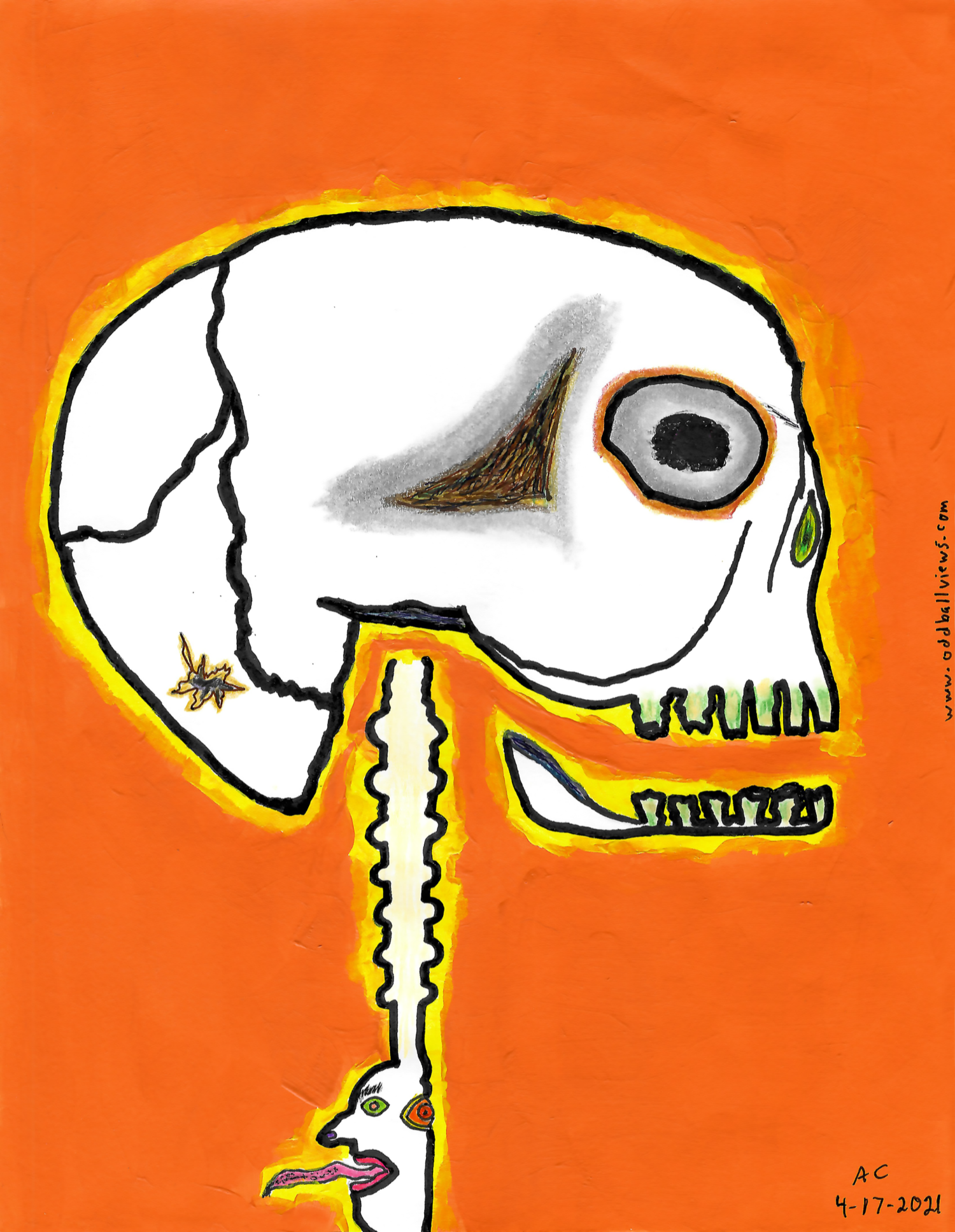
Jack Spratt
On the edge of Stillwater County, where the city’s glare dims into cornfields, an old tobacco barn gleamed orange in the dusk—its walls hung with a single painting titled “Jack Spratt”. Rumor said the artist vanished after unveiling it. Tonight, five strangers gathered for a private showing: a cacophony of misfits ready to confront whatever lurked in the shadows.
SIMONE, a punk botanist with spiky green hair, eyed the skull-and-spine motif through her safety goggles.
ARTIE, a retired tax inspector turned performance poet, chewed his lip as if calculating a prime number.
ELSIE, a conspiracy blogger, tucked her recorder into a hollowed bone console.
MARCO, a snarky food critic in a vintage chef’s coat, sniffed at the scent of fermenting hay.
LANA, the county health inspector, adjusted her crisp badge and muttered about code violations.
They’d been invited by an anonymous patron who promised each a lucrative commission—they just had to survive the night.
As Simone flipped on an ultraviolet lamp, the skull’s jagged teeth and glowing spine leapt into neon relief. Beneath the paint, she spotted tiny runes that pulsed like a heartbeat. “Looks alive,” she murmured.
Marco rolled his eyes. “Art doesn’t have pulses. Unless you’re rating its flavor.”
But when Artie dropped his flashlight, the beam landed on a human femur mounted below the canvas. It wasn’t part of the décor—no plaque, no explanation—just a bone borrowed from somewhere far darker than a barn.
Elsie clicked her tongue. “They’re feeding us breadcrumbs.” She played back her recorder. In the dead air, a low chuckle wound through the static.
Lana’s voice quivered. “This place is unsanitary.” She scanned the rafters for mice—or worse.
A sudden scrape echoed from the loft above. Simone lunged for a rusted grate. Beyond it, something moved: a pale hand, knuckles rapped like a restless sleeper.
MURDER MOST DIETARY
Artie cleared his throat. “You know the old rhyme—Jack Spratt ate no fat, his spouse ate no lean, and so between them both they…”
He faltered, staring at the painting’s dripping jaw. “We don’t know what they ate. Something twisted.”
Marco laughed. “If this is a dinner party, it’s catering to nightmares.”
They ascended into the loft, where crates of rotting sausages lay strewn. Someone had carved initials into each one—S I M O N E, A R T I E, E L S I E, M A R C O, L A N A—in sloppy, bloodlike script.
Lana gagged. “I inspected all local butchers this month.”
Elsie’s eyes sparked. “Letters match the runes. We’re next.”
A guttural moan rattled the rafters. Artie vaulted onto a crate, performing an impromptu war dance. “Show your faces, you macaroni phantoms!”
From the shadows strode MAB, the barn’s caretaker—an anti-establishment druid who believed corn stalks whispered truth. He grinned, jaw unnaturally wide. “You’ve read the script wrong. This isn’t about diet—it’s about debt.”
He explained: the painting was a ledger of sins encoded in bone and pigment. Each volunteer had, unwittingly, been recruited to repay a cosmic bill: Simone for a noxious fertilizer spill, Artie for misreporting a subsidy, Elsie for defaming a mayor, Marco for blaming an innocent chef, and Lana for falsifying an inspection.
As Mab spoke, the painting’s skull seemed to inhale. Simone’s runes glowed; Artie’s bowels churned; Elsie’s recorder filled with whispers of past crimes; Marco’s vision warped into culinary horrors—boiling eyeballs in broth; Lana’s badge melted like a sugar sculpture.
Panic erupted. Simone hurled her UV lamp at the canvas. It shattered, revealing a hidden door shaped like a vertebra. Mab stepped aside, chanting. The door swung open onto a spiral staircase of cracked plaster and moss.
“Your final course awaits,” Mab intoned.
DOWN THE RABBIT WRENCH
They tumbled a long time, into a subterranean chapel painted in barn-red ochre. At its center, a banquet table groaned under a feast of human-shaped terrines and chalices of dark liquid. Candles fashioned from bone bones flickered, casting jittery shadows.
Marco fainted at the sight of his own likeness carved in pâté. Artie recited damp odes to creeping mildew. Simone knelt to uproot mushrooms sprouting from the floorboards. Elsie tried to transcribe every creed Mab invoked. Lana somberly checked the table’s cleanliness.
From the gloom stepped SARAH, a bristly anarchist scholar who’d crashed the party via a digested poem about property. “Time’s up,” she snarled. She held a grimy ledger—its pages scribbled with their names and ledger entries: “PAST → DUE NOW.”
She lifted a chalice. “Drink, confess, or face the grin.”
The skull on the wall suddenly grinned wider, teeth separating to reveal a slit. Smoke poured out.
Without thinking, Simone hurled a handful of spores into the smoke. The room filled with phosphorescent green clouds. Screams became coughs, then laughter. Mab’s chanting stuttered. The terrines shivered on the table as if alive.
When the spores cleared, the chapel was empty—no feast, no Mab, no ledger. Only the barn above, silent as a tomb.
They stumbled back into the night, carrying nothing but half-remembered guilt and ruined clothes. Marco looked at his reflection in a puddle: hollow-eyed, shirt stained. Artie scratched a limerick onto a matchbook. Elsie’s recorder was blank. Simone’s boots sprouted tiny mushrooms. Lana’s badge was warped into a rib bone.
As they parted under the weak streetlights, none spoke of a resolution—only that they’d been fed a cosmic joke with an appetite for human vanity. And somewhere in the barn, the spine of that painting, buried beneath splinters, waited for its next diners.
No one in Stillwater County ever mentioned Jack Spratt again—except on nights when you thought you heard something cracking behind the boards, as if the skull were polishing its grin.
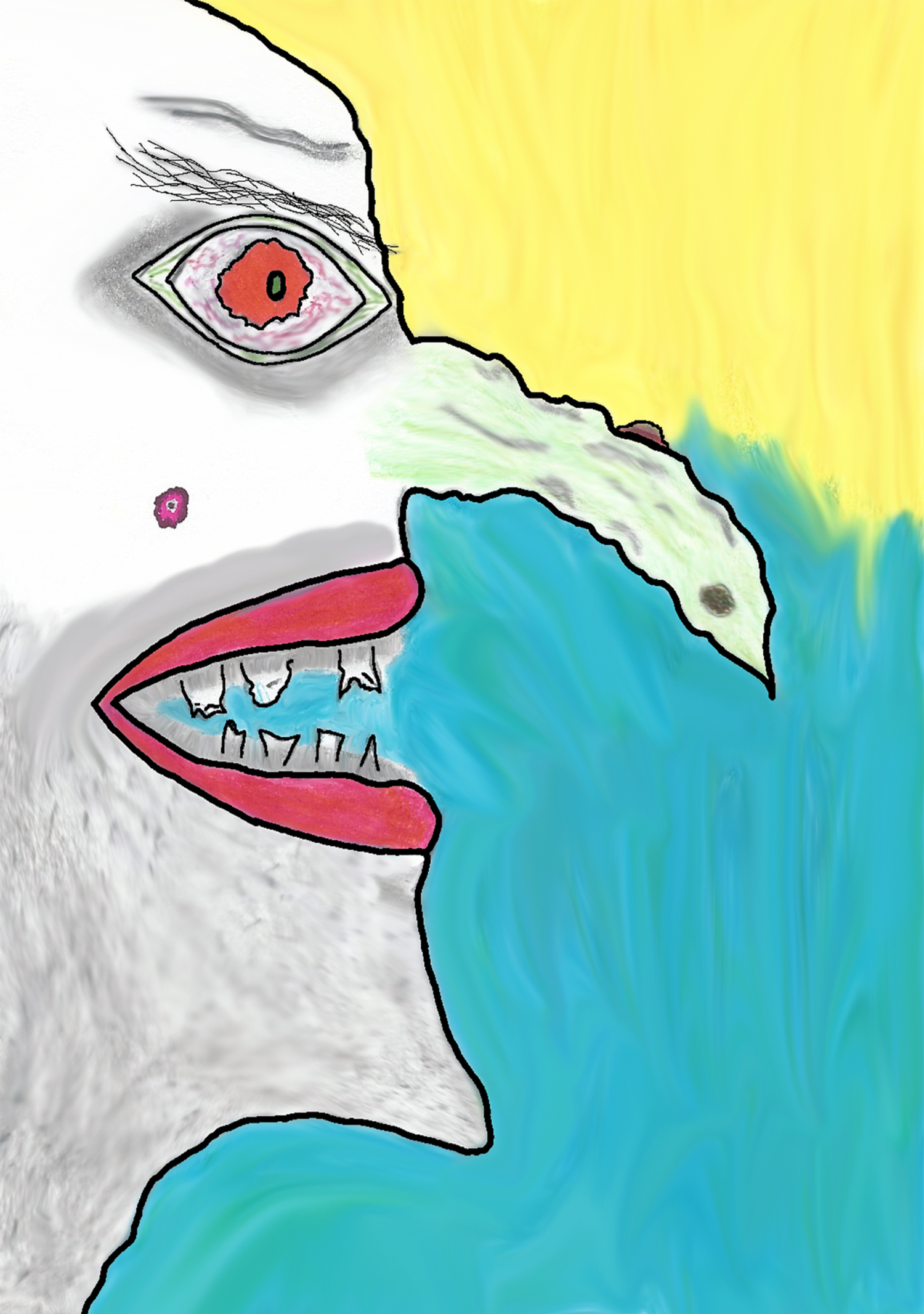
Candy Man
The Fourth Dimension—where time could slither backward, gravity sighed in tangles, and reality was a kaleidoscope of possibilities. It housed the Enigma: a realm of oscillating mirages and ancient whispers. At its heart prowled the Candy Man, a creature born of forgotten worship: a face pale as moonlight, a nose like a vulture’s beak, eyes glowing crimson, and a grin of razor-sharp teeth. He guarded a lost treasure—the Heart of the Enigma—rumored to reshape existence itself.
Five travelers converged, each pulled by fate’s crooked teeth:
- Zara Shevani, a shadow-witch from the Shifting Dunes, whose fingers tasted sand and starlight.
• Elias Moreau, a luminar scholar from the City of Mirrors, chasing truth in fractured reflections.
• Lila N’Golo, an earthseer from the Singing Woods, hearing spirits hum beneath every leaf.
• Roderick Vance, a rogue cartographer of parallel maps, selling secrets he only half believed.
• Madame Sinclair, a firebrand anarchist sculptor, her art a jagged revolt against cosmic order.
None trusted the others. Zara sniffed the air around Roderick’s maps and sneered. Elias scrawled footnotes about Lila’s songs. Sinclair painted rancor into every support beam. Yet all had come for the Heart—a pulse of pure creation.
- Arrival at the Turning Gate
Their journey began at the Turning Gate, a floating arch of molten crystal. To pass, each offered a shard of their past:
– Zara tossed a vial of sand from her homeland—long buried in betrayal.
– Elias laid down a prism of stolen thoughts.
– Lila sang a dirge for a forest she once burned.
– Roderick spilled ink on his maps—routes sold to tyrants.
– Sinclair hurled a shard of her first broken sculpture, born in midnight fury.
The gate wavered, then pulsed open. Beyond lay shifting corridors of violet mist.
- The Mirror Chamber
They entered a hall of mirrors, walls rippling like water. Reflections mutated: Zara’s shadow seeped into Elias’s glass face; Lila’s eyes flared on Roderick’s maps; Sinclair’s sculpted rage leapt from echo to echo. Each saw visions of betrayal—old wounds reopened.
Tensions ignited.
Elias accused Roderick: “Your maps have guided warlords.”
Roderick countered: “You fueled propaganda with your words.”
Zara hissed: “You sing for spirits? I’d rather trust nothing.”
Sinclair spat: “Your gentle soul masks cowardice.”
Lila trembled, tears tracing sap-like lines.
The Candy Man watched from a mirrored alcove. His grin flickered, as if savoring their discord.
Madame Sinclair, furious, smashed a mirror. Glass exploded into violet butterflies that swirled and recast into a new path: a spiraling staircase. They trudged upward, grudges simmering.
III. The Hall of Whispering Bones
Next came a crypt lit by phosphorescent fungus. Cracked skulls hummed riddles—crumbs of ancient lore about missing treasure buried beneath star-sundered mountains. To proceed, each recited a secret:
Zara revealed the blood in her sand—of exiled kin.
Elias confessed to plagiarizing a prophecy.
Lila admitted she sold a spirit’s voice for fame.
Roderick owned up to forging borders between lives.
Sinclair bared her first act of violent art.
With each secret, bones rattled. At last, the skulls parted, revealing a door of vertebrae.
- The Candy Man’s Feast
They stumbled into a banquet hall floating in a pink sky. A table groaned under impossibilities: crystalline fruits that screamed when sliced, chalices of liquid laughter that turned bitter on the tongue, and a colossal cake frosted with eyes. At the head sat the Candy Man, his pointed nose stealing the room’s scent—earth and ozone, fear and longing.
He gestured to the feast. “To earn the Heart, you must dine on your true selves.”
Zara bit into a glowing berry that burned memories of her prey. She cried out as her victims’ faces flickered through her mind. Elias gulped laughter wine, tasting mockery of his own vanity. Lila hesitated before scooping up a spoonful of cake—its eyes stared back like mirrors. Sinclair laughed, impatient, and carved a chunk—only to realize its flavor was her own rage, raw and metallic. Roderick choked on fruit that tasted of betrayals, his hands slick with sour juices.
When the last crumb was consumed, the table vanished. The sky cracked, raining fragments of star-metal.
- The Heart’s Reckoning
They fell through shards to the Enigma’s core: a floating gemstone pulsating with swirling galaxies. The Candy Man emerged, teeth bared. “Behold the Heart of the Enigma. Power to remake worlds…at the cost of self.”
Elias reached out. Zara hesitated. Lila wept. Roderick’s fingers twitched. Sinclair bellowed, “We refuse your price!”
The Candy Man’s laughter rolled like thunder. Reality flickered: Elias’s body split into two, one of light, one of shadow. Zara’s sands spilled upward. Lila’s voice echoed in ten keys. Roderick’s maps unraveled. Sinclair’s rage detached and leapt at the Heart, only to be burned to charcoal.
He paused. “You cannot claim the Heart without fracturing truth. Every gift demands a sacrifice.”
- A Fragile Accord
Defying him, the group linked hands. Their combined defiance rippled through the heart’s core. Shards of self-revelation envisioned a new outcome: unity without erasing flaws. The gemstone cracked, fragments drifting into each traveler. Pain and clarity mingled as they absorbed shards of each other’s truths—Elias gained Zara’s grit, Zara found Lila’s empathy, Lila borrowed Sinclair’s fire, Sinclair tasted Roderick’s cunning.
The Candy Man flickered, uncertain. Then he smiled—an almost fond curl of razor teeth—and evaporated like mist at dawn.
VII. Aftermath
They awoke on a foggy cliff overlooking the Enigma. The Turning Gate shimmered behind them, open for new journeys. Their conflicts remained—in the aching joint of Zara’s shoulder (now infused with Elias’s light), in Lila’s anxious hum when tempers flare, in Sinclair’s fractured sculpting that blurred anger and compassion, in Roderick’s maps that now curved with strange empathy.
They departed on separate paths but bound by a fragile thread of mutual understanding. No one wielded the Heart. Instead, they carried pieces of each other’s stories, each shard a reminder that unity in the fourth dimension is a tenuous miracle—one that must be guarded against slipping back into ego’s gravity.
And somewhere in the shifting sky, a distant figure watched through crimson eyes, waiting for the moment reality might fracture again.
